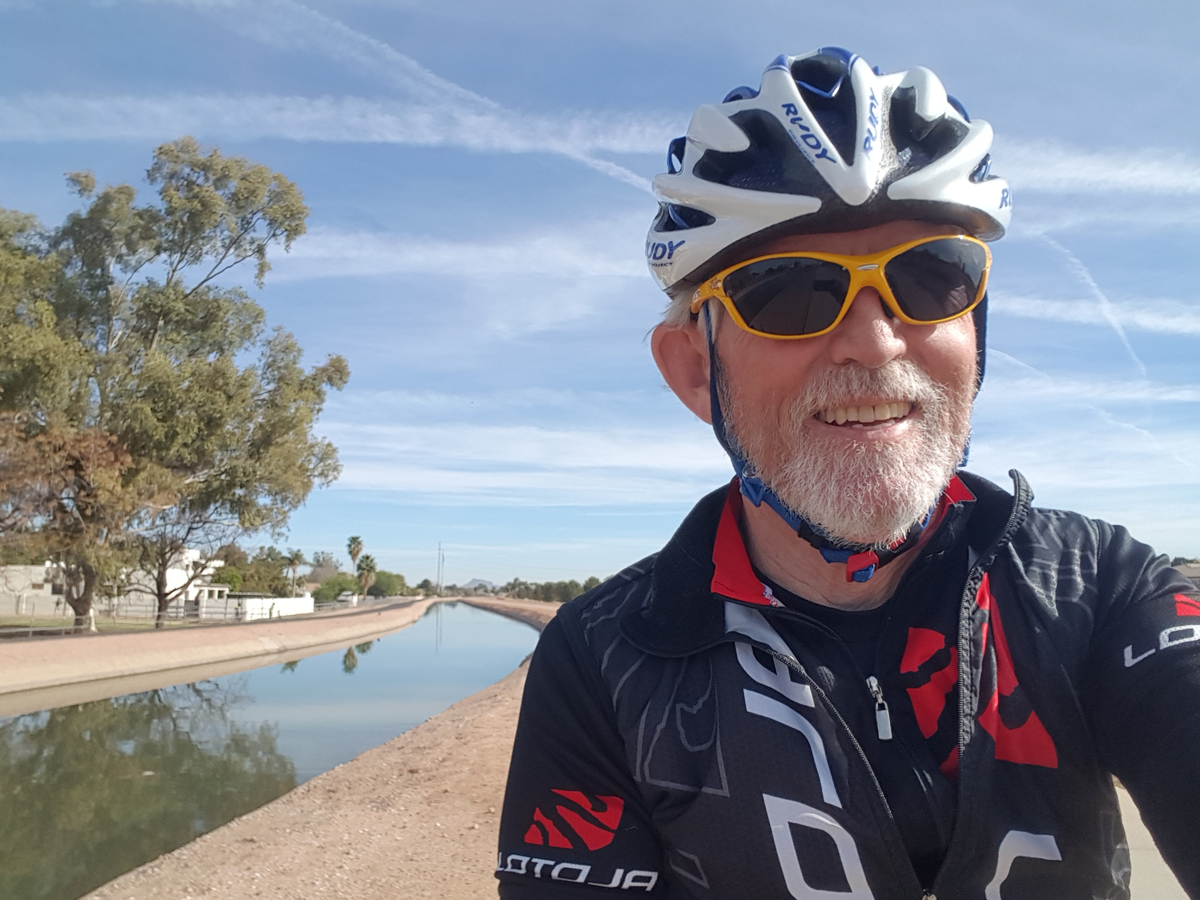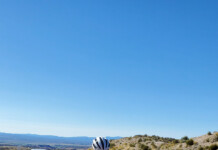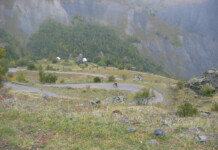By David Ward — For this month’s column, I dug into the archives for one of my favorite articles. This is one I wrote 19 years ago about my mom, my southern Idaho roots, and a ride through memory lane. I hope you enjoy it as much I enjoyed the ride and writing about it. After 15 years, this ride still owns a tender spot in my heart.
Yesterday’s Ride (June, 2002)
Going for a bike ride is always fun. But occasionally, you experience a ride that connects with you in a way that makes that ride memorable and creates an indelible impression upon your mind. I had that experience yesterday.
My grandmother, Marinda Irene John, after whom my daughter Marinda is named, was born and raised in Portage, Utah, a small farming community bordering on Utah in the Malad Valley. (For you non-continentals, “malade” in French means “sick”. The Malad Valley is a lovely valley, so I have always wondered about the origin and significance of its naming.)

Yesterday, we attended a John Family reunion in Portage. It was a small gathering of approximately 50 people, of whom I knew only my father, his wife Louise, and my aunt and uncle. Still, it was a pleasant and enjoyable gathering on a gentle and relaxed country afternoon, consisting mostly of people who live or were raised in this or a similar rural community.
We were on our way to Pocatello to spend Father’s Day with my dad. He is president of the John Family organization this year, and invited us to attend the reunion if we were able. As we were going to Pocatello anyway, we decided to leave a little early to attend. Afterwards, my wife would drop me off in Malad from where I would ride the rest of the way to Pocatello.
As the reunion wound down and after the raffle was completed, an older gentleman took out his saxophone and began playing music to a prerecorded background. First thing I knew, my dad had grabbed my oldest daughter and was dancing with her between the tables of the park pavilion. He is 82, and still dances the two-step with an ease and enjoyment I envy. After that, he pulled up his wife, Louise, and began dancing with her.
I don’t know if it was just seeing him dance with his wife, or the gathering on this country afternoon winding my thoughts and feelings back toward the community and life of my youth. But at that moment, my mother’s memory flowed into my consciousness and a flood of feeling filled my heart. My mother had not been able to dance for decades, but this whole setting spoke of her, and the life and people she loved. I am grateful for Louise. She is a kind and good person, an enjoyable companion for my dad, and a blessing in his life. But at this moment, I found myself longing for my mother’s presence to make this picture complete.
After the reunion, my wife dropped me off as planned. I do this ride once or twice a year, but usually from the other direction. I start in Pocatello and work my way back toward Malad, usually being picked up somewhere on the way depending on how much riding time I have. So, I generally make it about 30 to 40 miles southward. Because I was riding the opposite direction and from approximately 65 miles away, I would be covering some country I seldom ride. Indeed, the first four miles would be a country road I had only observed from the freeway during my numberless drives north, had wanted to ride, but had never done so.
As I set off, it was a hot and dry, late southern Idaho afternoon. I rode alongside the irrigation ditches and heard and observed the numerous red-shouldered blackbirds hanging and flying around the life-sustaining water. I observed a bird I had not heretofore recognized, a slim erratic bird with a grey head and chest, and contrasting bright yellow stomach. I need to look that one up in my bird book, I thought.
As I rolled the four miles leading to the Devil Creek Reservoir dam, I passed grain and alfalfa fields on either side of me, along with numerous discarded and mostly forgotten old farm buildings and equipment. Evidence of the surrender of the small family farm to large scale farming is all around. So, too, is the advancing tide of urbanity, with its new homes just beginning to dot this pastoral setting.
After climbing to the level of the dam and riding along the reservoir, I caught the old highway, Highway 191, that basically parallels Interstate 15. This stretch from the reservoir to the top of the Malad pass is a rolling, winding road through the verdant hills of the Malad Pass. I recall driving this road during my trips as a student back and forth between home and Brigham Young University. I enjoyed this drive then, and I found it most pleasant and enjoyable yesterday.
After descending most of the way down the north side of the pass, I turned left on to Marsh Valley road. Soon, I rode into the sweet scent of the sagebrush blanketing the valley. Sagebrush and its fragrance permeates this landscape, and the landscape of my memories. My thoughts were again swept back to my mother. She loved the smell of sagebrush, so much so that a sprig of sagebrush was enclosed in her casket when she passed away. Again I reflected on how she loved this dry country. One of her favorite books was Letters of Long Ago by Agnes Just Reid, a resident of Blackfoot, Idaho. This book tells the story of Reid’s mother, a pioneer settler of southern Idaho. Its descriptions of this south Idaho landscape, which some inaptly call desert, and the life of this pioneering lady endeared this book to my mom.
I wound my way along the west side of the McCammon Valley till the road finally angled right, eventually coming alongside Interstate 15. After another couple of miles, I was at the Interstate exit for Arimo. Feeling a little heat exhaustion and dehydration, I stopped at the local Sinclair station to refill my water bottles and downed a can of Coke.
Refreshed and reloaded with sugar and caffeine, I took Arimo Road back west for a couple of miles, and then turned right onto Robin Road. I followed this north for a couple more miles and then left again onto Marsh Creek Road. From here to Inkom is my favorite stretch of this ride. The road winds and rolls underneath the sloping foothills on the west, with a narrow vale of verdant vegetation flowing with Marsh Creek between the road and the walls of the sagebrush covered lava flows about a quarter mile to the east. Evening was settling in, and with it the fresh, cool country air. As I pedaled, Marsh Creek slowly meandered along, with cattle and horses grazing in the sweet grass along its banks.
I happened to catch sight of a sandhill crane walking amid the horses and cattle. The robins were flying back and forth, and I also caught sight of a golden eagle floating above the treetops. Occasionally I passed an old homestead, knowing that these would become more numerous, along once again with the encroaching urbanity, as I neared Inkom and Pocatello.
As I was climbing a short hill, a pickup truck pulling a trailer loaded with irrigation pipe passed me by. A couple of young men sitting on the trailer waved and called, smiles on their faces. Friendly folk live here. As with these two young men, most looked up and waved at this lone sojourner making his way through their vale and his memories.
Finally, I rode into Pocatello. On the southern end, I took the road running through Ross Park. I noted the zoo is still there, and looking better. Of course, now one has to pay to get in, whereas it was free when I was a kid. My parents used to come to Ross Park on warm Sunday evenings to listen to a local brass band. As kids, we were off to the zoo and the amusement park. I especially loved the flying swings, a carousel from which attached swings flew up and out as the carousel twirled. We enjoyed the merry-go-round, the small train that circled the amusement park, and cotton candy from the concession stand.
Just before I finished my ride, I rode past Alameda Park. My memories of July 24th celebrations and watching and playing softball at this park came forward in my mind. We were country hicks, hailing from the small farming community of Tyhee, just north of Pocatello, and Alameda Park really seemed cosmopolitan to me.
Southern Idaho is a part of me, firmly imprinted upon the pathways of my soul. I am always amazed that my children consider themselves Utahns. I have lived in Utah, except for a couple of years spent in France, since I was 18 years old. But I am, and always will be, an Idaho boy, and specifically a southern Idaho boy.
Like my parents, I love this landscape and its people. Or maybe it is my memory of this landscape and its people that I love. I don’t suppose it really matters. I do know that I really enjoyed this ride. It was a nostalgic sojourn for me, made poignant by the events of the day and the memories and tender impressions embedded in my heart.
I especially loved the fragrant scent of the sagebrush.








